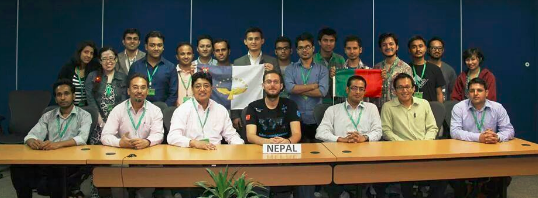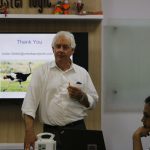Sparktalk 15th edition:
International Trends in Business Incubation
Date & Time
June 27, 2017
5 pm
Venue
NEHUB
Gairidhara, Kathmandu
Speaker
Mr. Andre Leonardo
TV Presenter & Author at Faz Acontecer

Speaker Profile:
 Mr. Julian Webb
Mr. Julian Webb
Mr. Julian Webb is a Business Incubation Consultant at infoDev World Bank. He presented on the topic, International Trends in Business Incubation. He also interacted with the guests regarding various challenges and opportunities in Nepal’s incubation scenario.
Learning:
Initiating his presentation on entrepreneurs and entrepreneurship, Mr. Webb in his opening remarks stated that “Entrepreneurship is like searching for gazelles and unicorns and it’s never been so cheap to start a business”, but contradicting this he also stated that the rate of entrepreneurship is declining in the west and the trend of older people taking on the route of entrepreneur is greater than the number of younger people starting out. In accordance to Mr. Webb some of the factors contributing to this decline in number of startups in west are;
- Higher debt levels;
- More distrust and fear;
- Culture;
- Wealth concentration;
- Uncertainty.
He also stated that “There is no guaranteed formula for success and most new businesses don’t succeed, but 80% of incubator clients don’t fail”. Moving on with his presentation Mr. Webb highlighted on the differences between Accelerators, Coworking Spaces and Incubators.
Accelerators:
A fixed-term, cohort-based program, including mentorship and educational components, that culminates in a public pitch event or demo-day (Cohen, S. 2014).
Mr. Webb highlighted the “Do Well” and “Don’t Do” of Accelerators;
| Do Well | Don’t Do |
| Market validation | Build companies |
| Business model validation | Products and technologies with long development cycles |
| Pivot for best product/market fit | Follow and engage graduates |
| Intensity and Speed | Build community of entrepreneurs |
| Excellent source of seed capital | Provide sustained support for companies |
| Engage mentor community | Generate revenue for the program |
Regarding the success of accelerators, Mr. Webb stated that “No one knows if accelerators are successful or not because it is too early and the modality in which accelerators functions keeps changing” but he pointed out Y- Combinator, Telluride & Tech Stars as early leaders in accelerators.
Co – Working Space:
Mr. Webb highlighted that, Co – Working Spaces are growingly rapidly and proliferating everywhere and is most suitable for new growing workforce of people who work where, when, how, and why they want. “The key elements of co – working spaces are Space, Learnings & Community”, stated Mr. Webb. He also highlighted that renting spaces was the key source of revenue for Co–Working Spaces.
Mr. highlighted some of the key Advantages and Challenges of Co-Working Spaces;
| Advantages | Challenges |
| Flexible and adaptable concept | Community building |
| Varied client types | Does not necessarily involve a business development program |
| Easy to incorporate in traditional incubation | Outcomes hard to track |
Incubators / Incubations:
Highlighting the key elements of Incubation, Entry/Selection & Exit/Graduation; Linkages; Resident, Outreach & Virtual Services; Business Support; Access to finance. Mr. Webb stated the different models of Business Incubator;
- Ownership;
- Profit Motivated;
- Area of Activity;
- Purpose;
Like Co-Working spaces almost 53% of revenue accounts from Rents and Clients fee for Incubators. Talking about the aforementioned modality of incubators, Mr. Webb highlighted some of the successful incubators operating worldwide which included, PowerHouse Ventures New Zealand, BCC New Zealand, CropLogic, Invert Robotics,
“While everyone is running after gazelles and unicorns why don’t you run after Ostrich” stated Mr. Webb in his closing remarks.
